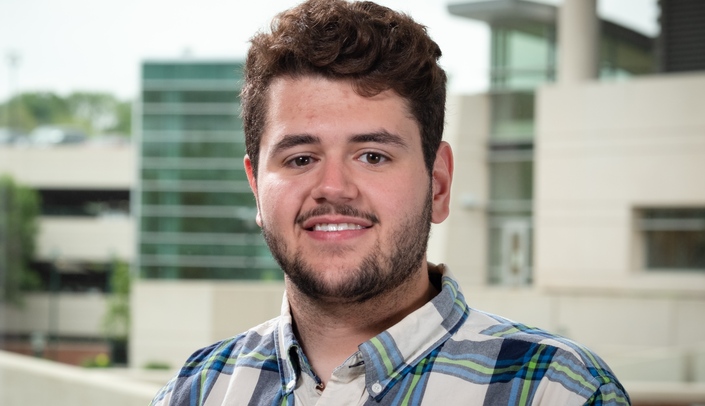It was a packed house on Aug. 6 at the Lied Lodge in Nebraska City where the NE-INBRE held its 17th annual conference.
Much to the chagrin of Josh Lindenberger, a 2019 INBRE Scholar from the University of Nebraska at Kearney, who stepped before the group to present findings from his 10-week summer research experience.
"It was neat to apply what I had learned but I was really nervous about answering questions," Lindenberger said.
Lindenberger grew up in North Platte, Neb., and said he never dreamed he would one day be conducting cancer research at an academic medical center, much less presenting findings at a scientific meeting.
But the NE-INBRE program is tailor made for students like Lindenberger, who is pursuing a molecular biology degree at the University of Nebraska at Kearney.
And the annual meeting is the opportunity for each new undergraduate student who joins the program as a scholar to gain the confidence on the stage.
"The NE-INBRE provides the platform, the mentoring and the resources for undergraduate students like Josh to succeed in and outside of the lab," said Paul Sorgen, Ph.D., a professor in the department of biochemistry and molecular biology at UNMC and principal investigator of the $16.2 million National Institutes of Health grant that supports the program.
The program is designed to help students explore the world of biomedical science during their undergraduate years to determine if research is something they will pursue after graduation.
Lindenberger spent his summer doing work on pancreatic cancer at the University of Nebraska Medical Center in the lab of Moorthy Ponnusamy, Ph.D., an assistant professor of biochemistry and microbiology at UNMC.
"When I was 13 I dreamed I would eventually be able to work at UNMC, here I am at 20 living the dream I had as a teenager because of INBRE," Lindenberger said.
To top it off, at the annual meeting Lindenberger placed third for his oral presentation on the role of cancer-associated fibroblast in proliferation and migration of pancreatic cancer cells receiving a Richard Holland Future Scientist Award from the Nebraska Coalition for Lifesaving Cures.
